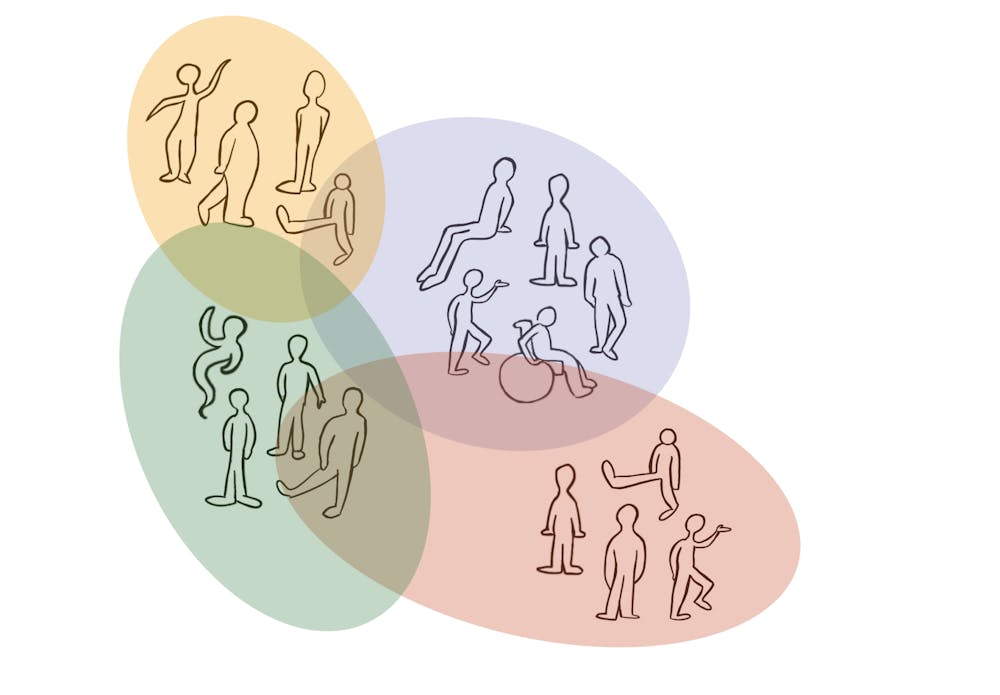Upon my arrival at Hopkins, it seemed that everyone around me immediately congregated into friend groups. At first, these social clusters were loose and ever-changing, breaking apart and re-forming like schools of fish.
I kept hearing people say, “Join as many clubs as you can” and “Put yourself out there.” The hostess at HomeSlyce Pizza Bar told me, “It took me till junior year to find my people. Don’t worry, you’ll get there.”
It all comes back to “your people.” When I was fresh out of high school, I envisioned my time at college as both an academic and social breakthrough. I’d have a group of friends with whom socializing felt easy. I wouldn’t have to think, “Oh, this big campus event is coming up. Who can I go with?” Our presence would be stitched into each other’s routine by both circumstance and choice.
From its design, Orientation Week was intended to help us find just that. And, while everyone’s experience was different, for me it felt like an endless loop of listing my name, major and hometown. It wasn’t exactly unpleasant, but it did feel overwhelming, and I didn’t make any lasting friends during that process.
This is the point where I’m supposed to give you a piece of shining advice that brings your ideal friend group into existence. As a disclaimer for what’s to come, if a secret alchemy formula that materializes a friend group does indeed exist, it has not been shared with me. What I do have to offer, though nowhere near as useful, is my own experience.
My roommate and I became fast friends. Being the more social of us, she dragged me to all the fun and interesting events on campus. As the days progressed, a string of coincidental occurrences looped seven freshmen, including us, into one orbit. Even after meeting those who would soon become some of my closest friends, it took some time for me to feel at home with them. With the rush of college and the various stimuli to juggle in group settings, I didn’t immediately click into the group rhythm.
Slowly, my chattiness unfolded. Conversations spiraled from jokes indecipherable to an outside ear to those spoken softly and seriously. We’d marvel at the idiosyncrasies of each other’s states and countries, pile into our freshman dorm basements for late-night dinners and delight at bumping into each other around campus. The group dynamics slowly took shape, becoming clear and solid.
“What good luck,“ I thought to myself, even back then. I had friends from high school who joined every club at their colleges and went to every orientation event and still felt disappointed in their social lives. Sure, they knew someone from this club or that club, they checked their statistics homework with a classmate every Friday and had dinner with a work friend every so often. They’d built a mosaic of connections, but this cohesive, self-contained friend group they were looking for hadn’t appeared. Their people.
And this is where I’d like to suggest an addendum to the advice I was given my freshman year. Yes, join clubs you’re interested in and go out and meet people. But the formula of (put yourself out there) + (time) doesn’t ensure that you’ll find your perfect group in the next four years.
I hesitate to let my words of advice be, “Get ready for your expectations to remain unmet.” Though I think, at its core, that’s what I’ve learned. Expectations have the startling power to eclipse what’s right in front of you. Many of my relationships have faded, but my time here would have been significantly more challenging if I hadn’t had lunches with an Introduction to Fiction and Poetry classmate every so often or gone over physics homework with acquaintances. I don’t think it’s an exaggeration to say that every person I’ve met has played a hand in defining my time at college.
Yes, some of these groups — fleeting, constantly evolving — may not be what I envisioned. But as the initial rate of mutation in the social fabric has started to slow down, I’ve grown to appreciate the interconnectedness of me, the groups around me and our neighbors who make too much noise at three in the morning.

















